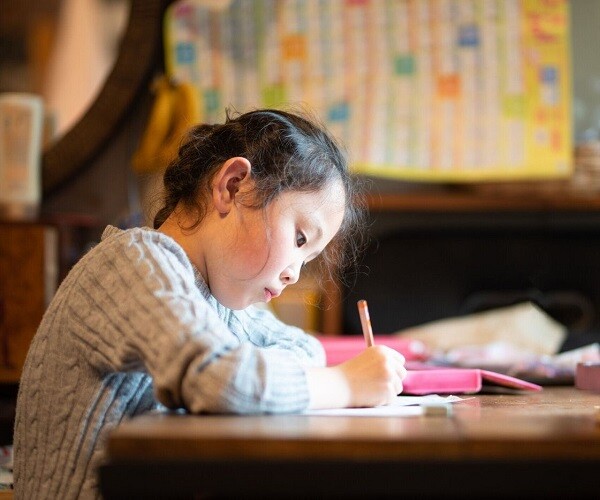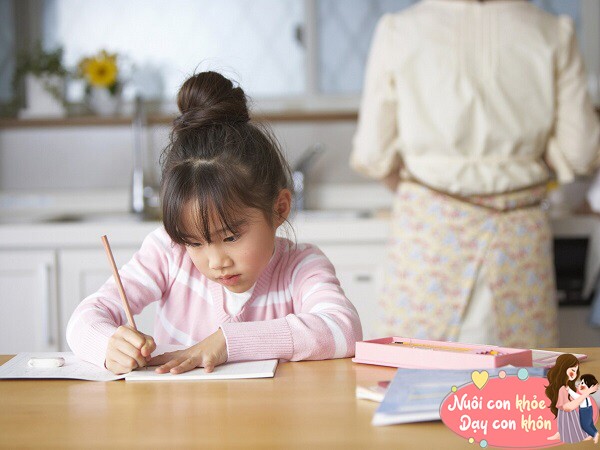Unhealthy expressions of parental love can have adverse effects on a child’s learning process.


Stop expressing your love for your child in these four inappropriate ways:
Over-interference
Some parents tend to interfere when their child is doing homework or playing.
For instance, while the child is focusing on drawing based on their own ideas, parents offer multiple suggestions, believing that the artwork would be better if the child followed their advice.
Although this behavior may seem helpful, it actually disrupts the child’s serious thoughts and destroys their concentration.
Interrupting the child’s learning process
Imagine your child is concentrating on reading a book, but every few minutes, you ask, “Are you thirsty?” or “Are you hungry?”
It takes a lot of effort to focus on the book, but the child’s concentration is constantly interrupted by your well-intended inquiries. How can they possibly maintain their focus?
This form of attention not only prevents the child from concentrating on reading but also leads to boredom and even rebellion.
Relying solely on rewards
To motivate their children to study, some parents establish various reward systems. However, overusing rewards can backfire.
For example, if a child completes a homework assignment or scores well on a test, the parents immediately reward them with a new toy.
While it’s true that rewards can stimulate a child’s motivation to learn in the short term, they are not beneficial in the long run.
The biggest drawback is that it can make children dependent on external incentives, causing them to lose intrinsic interest and focus on their studies. In the future, they may struggle to take the initiative in their learning if rewards are not offered.

Interrupting the child’s learning process.
Overprotection
Some parents tend to be overprotective, worrying that their child might get hurt or bullied, so they restrict their activities and exploration.
For instance, the child wants to play with sand, but the parent is concerned about dirty clothes… all sorts of obstacles get in the way.
In the parents’ eyes, they are doing everything to protect their child. However, the consequence of this overprotection is inadvertently depriving the child of opportunities to develop their concentration skills, life skills, and social interaction abilities.

What should parents do to cultivate their child’s concentration during study time?
Provide ample personal space
Parents should grant their children freedom and allow them to enjoy ample personal time and space. This way, children can explore, play, and learn more independently.
When given freedom, children will feel more comfortable expressing themselves, thereby maximizing their creativity and passion for learning.
However, this process also requires parental guidance and encouragement. Children need to know that their parents are ready to support and accompany them on their learning adventures.
Parents can participate in activities their children enjoy, whether it’s exploring nature, engaging in creative play, or reading books together.

Provide ample personal space.
Establish a healthy work and rest routine
Ensuring that your child gets enough sleep and rest will result in more energy for learning.
Therefore, help your child develop a consistent daily routine, including fixed bedtimes and wake-up times. As a role model, you should also avoid staying up late yourself.
When children get sufficient sleep, their mental and physical states improve, and their ability to concentrate enhances.
Encourage independent learning
Learning is a personal journey for the child. If they cannot organize their learning-related matters independently, they will struggle to achieve good results.
When children perceive studying as an essential part of their lives, they will be more motivated to excel.
Therefore, parents should encourage their children to study independently and create their study plans.

Encourage independent learning.
To support this process, parents can start by creating a comfortable and quiet study space where the child can focus without distractions.
A neat and well-lit study area with the necessary resources makes it easier for the child to stay organized and complete their schoolwork.
Additionally, establish a study schedule. Guide your child in allocating time for each subject and different activities, helping them develop organized study habits.
Reduce screen time
Today’s children are fond of electronic devices and often have access to mobile phones and tablets.
Prolonged screen time can lead to a lack of basic concentration and negatively impact their physical and mental health and learning abilities.
Therefore, parents should limit their children’s screen time and pay closer attention to the content they consume to prevent exposure to inappropriate material.







































